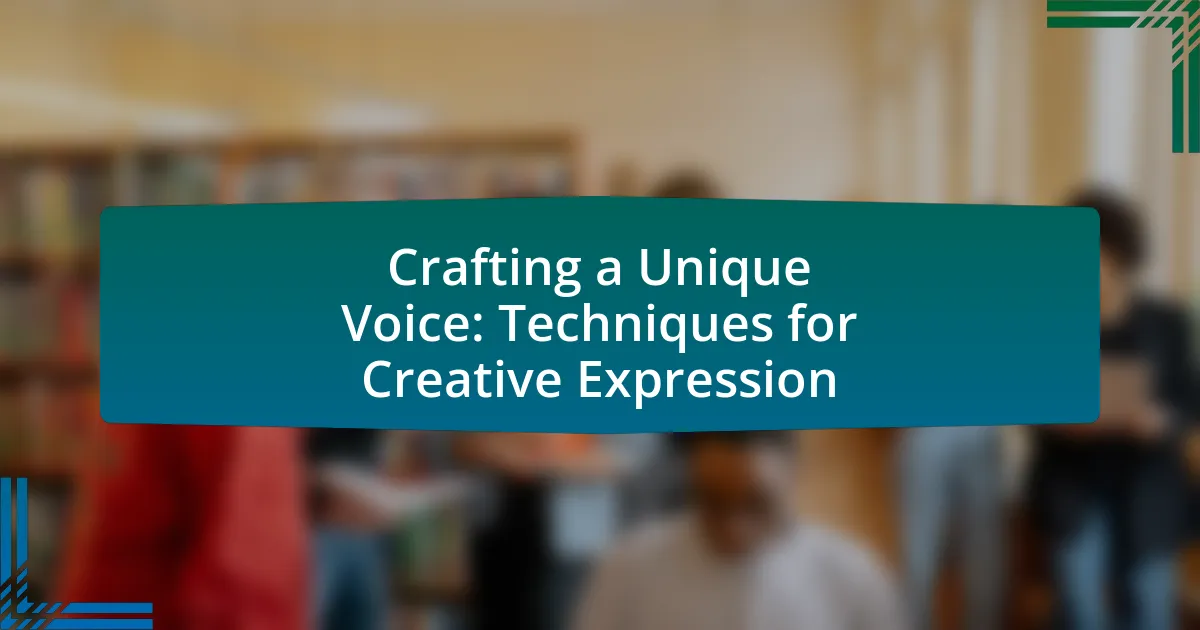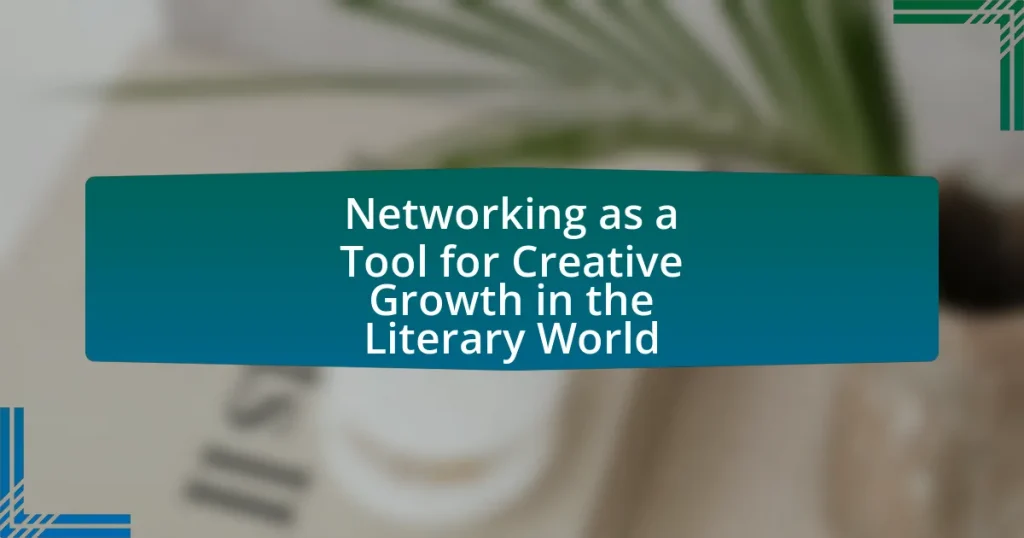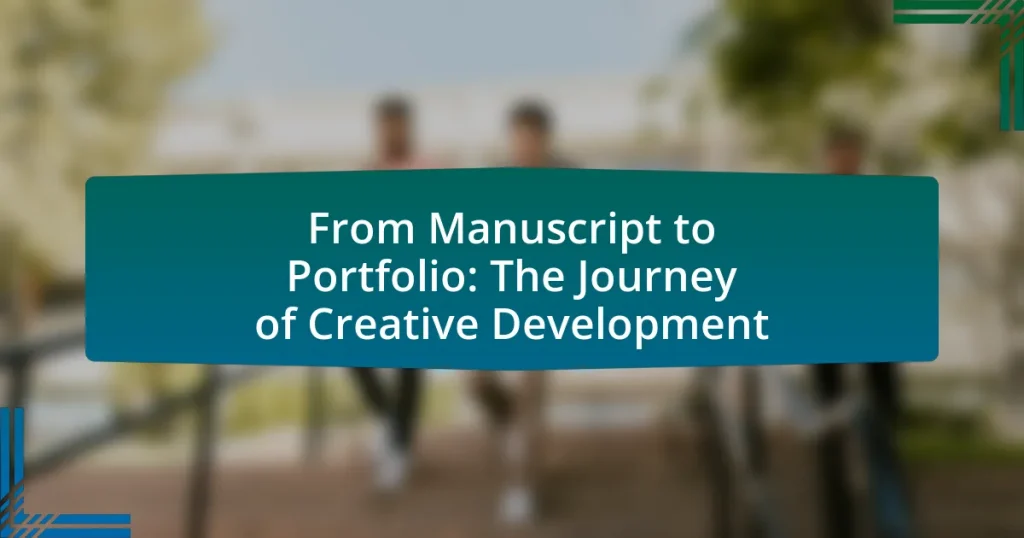The article “Crafting a Unique Voice: Techniques for Creative Expression” explores the significance of developing an individual style that distinguishes creative work. It emphasizes how personal experiences and emotions shape one’s voice, enhancing authenticity and audience engagement. Key techniques for cultivating a unique voice include free writing, reading widely, and seeking feedback, while collaboration with other creatives can further refine expression. The article also discusses the impact of diverse perspectives on creativity and offers practical tips for maintaining a distinct voice amidst external influences.

What does it mean to craft a unique voice in creative expression?
Crafting a unique voice in creative expression means developing an individual style that distinguishes one’s work from others. This involves the intentional use of language, tone, and perspective that reflects personal experiences and insights. For example, authors like Virginia Woolf and James Joyce are recognized for their distinctive narrative techniques and thematic explorations, which contribute to their unique voices. This individuality not only enhances the authenticity of the creative work but also resonates with audiences, making it memorable and impactful.
How can understanding your personal experiences shape your voice?
Understanding personal experiences shapes your voice by providing authenticity and depth to your expression. When individuals reflect on their unique life events, emotions, and perspectives, they cultivate a distinct narrative style that resonates with others. Research indicates that personal storytelling enhances emotional connection; for instance, a study published in the Journal of Personality and Social Psychology found that sharing personal experiences fosters empathy and understanding among audiences. This connection is crucial in creative expression, as it allows the voice to convey genuine emotions and insights, making the work more relatable and impactful.
What role do emotions play in developing a unique voice?
Emotions are fundamental in developing a unique voice as they shape the authenticity and depth of expression. When individuals infuse their emotional experiences into their creative work, they create a distinctive perspective that resonates with audiences. Research indicates that emotional engagement enhances storytelling, making it more relatable and impactful. For instance, a study published in the Journal of Personality and Social Psychology found that emotional narratives are more memorable and persuasive, highlighting the importance of emotions in crafting a voice that stands out. Thus, emotions not only influence the content but also the connection between the creator and the audience, solidifying a unique voice.
How can life experiences influence your creative expression?
Life experiences significantly shape creative expression by providing unique perspectives and emotional depth. Individuals draw from personal histories, such as challenges, triumphs, and relationships, which inform their artistic choices and themes. For instance, research by the American Psychological Association indicates that artists often channel their life experiences into their work, leading to more authentic and relatable creations. This connection between lived experiences and creativity is evident in various art forms, where personal narratives enhance the emotional resonance of the work.
Why is a unique voice important in creative fields?
A unique voice is important in creative fields because it distinguishes an individual’s work from others, fostering recognition and authenticity. This distinctiveness allows creators to express their personal perspectives and experiences, which resonates with audiences on a deeper level. For instance, authors like J.K. Rowling and musicians like Bob Dylan have achieved success largely due to their unique voices, which have set them apart in their respective industries. Research indicates that originality in creative expression can lead to greater audience engagement and loyalty, as seen in studies published in the Journal of Creative Behavior, which highlight the correlation between unique artistic expression and audience connection.
How does a unique voice differentiate you from others?
A unique voice differentiates an individual by establishing a distinct style and perspective that resonates with audiences. This differentiation occurs through the use of specific language, tone, and personal experiences that reflect individuality. For example, authors like J.K. Rowling and Ernest Hemingway are recognized for their unique voices, which contribute to their distinct storytelling methods and reader engagement. Research indicates that a unique voice can enhance personal branding and audience connection, as seen in studies on creative expression and identity formation.
What impact does a unique voice have on audience engagement?
A unique voice significantly enhances audience engagement by fostering a deeper emotional connection and establishing authenticity. When creators express themselves in a distinctive manner, it resonates with audiences, making the content more relatable and memorable. Research indicates that content with a unique voice can increase audience retention rates by up to 50%, as it captures attention and encourages interaction. This connection is crucial in a saturated market, where differentiation is key to standing out and maintaining audience interest.

What techniques can be used to develop a unique voice?
To develop a unique voice, writers can employ techniques such as free writing, reading widely, and experimenting with different styles. Free writing encourages spontaneous expression, allowing writers to discover their natural tone and rhythm. Reading a diverse range of authors exposes writers to various voices and techniques, helping them identify what resonates with them. Experimenting with different styles, such as poetry, prose, or dialogue, enables writers to explore and refine their voice further. These methods are supported by the understanding that voice is shaped through practice and exposure, as evidenced by numerous writing workshops emphasizing the importance of these techniques in developing a distinctive style.
How can writing exercises enhance your creative voice?
Writing exercises enhance your creative voice by providing structured opportunities for experimentation and self-discovery. Engaging in diverse writing prompts, such as free writing or character development, encourages writers to explore different styles and perspectives, which can lead to the emergence of a more distinct voice. Research indicates that regular practice in varied writing forms can improve creativity; for instance, a study published in the Journal of Creative Behavior found that writers who participated in creative exercises reported increased originality and confidence in their voice. This structured practice not only refines technical skills but also fosters a deeper understanding of personal expression, ultimately enhancing the writer’s unique creative voice.
What specific writing prompts can help in voice development?
Specific writing prompts that can help in voice development include: “Write a letter to your younger self,” which encourages introspection and personal reflection, allowing the writer to explore their unique experiences and emotions. Another effective prompt is “Describe a place that holds significant meaning to you,” which helps to evoke sensory details and personal connections, enhancing the writer’s authentic voice. Additionally, “Create a dialogue between two characters with opposing viewpoints” fosters the development of distinct voices and perspectives, encouraging the writer to articulate varied tones and styles. These prompts are effective because they engage the writer’s personal experiences and emotions, which are essential for developing a unique voice in writing.
How does free writing contribute to finding your voice?
Free writing significantly contributes to finding your voice by allowing individuals to express thoughts without self-censorship, fostering authenticity. This unfiltered expression helps writers discover their unique style, tone, and perspective, which are essential components of a personal voice. Research indicates that free writing encourages creativity and reduces anxiety associated with judgment, enabling writers to explore ideas freely. A study by Peter Elbow, a prominent advocate of free writing, highlights that this practice can lead to deeper self-discovery and a more genuine writing style, reinforcing the connection between free writing and the development of a distinct voice.
What role does reading play in shaping your unique voice?
Reading plays a crucial role in shaping your unique voice by exposing you to diverse styles, perspectives, and vocabulary. This exposure allows you to absorb different narrative techniques and linguistic nuances, which you can then incorporate into your own writing. Studies show that reading widely enhances creativity and critical thinking, as it encourages you to analyze and synthesize various ideas and forms of expression. For instance, a report by the National Endowment for the Arts indicates that individuals who engage in reading are more likely to develop strong writing skills and a distinctive voice, as they learn to articulate their thoughts more effectively through the influence of varied authors.
Which authors or styles should you explore for inspiration?
Explore authors such as Virginia Woolf, James Joyce, and Haruki Murakami for inspiration in crafting a unique voice. Virginia Woolf’s stream-of-consciousness style offers insight into character psychology, while James Joyce’s innovative narrative techniques challenge traditional storytelling. Haruki Murakami blends magical realism with everyday life, creating a distinctive narrative style. These authors exemplify diverse approaches to creative expression, making them valuable sources for developing one’s own voice.
How can analyzing different voices improve your own?
Analyzing different voices can significantly improve your own by providing insights into diverse styles, techniques, and emotional expressions. By studying various vocalists or speakers, you can identify unique elements such as tone, pitch, rhythm, and delivery that resonate with audiences. This exposure allows you to experiment with these elements in your own voice, enhancing your versatility and creativity. Research indicates that vocal mimicry and adaptation can lead to improved vocal skills and greater emotional connection in communication, as seen in studies on vocal training and performance psychology.

How can feedback and collaboration influence your unique voice?
Feedback and collaboration can significantly enhance your unique voice by providing diverse perspectives and constructive criticism. Engaging with others allows for the exchange of ideas, which can lead to the refinement of your style and expression. For instance, studies show that collaborative environments foster creativity, as individuals are exposed to different viewpoints that challenge their own assumptions. This interaction can help identify strengths and weaknesses in one’s voice, ultimately leading to a more authentic and polished expression.
What are the benefits of seeking feedback on your work?
Seeking feedback on your work enhances its quality and effectiveness. Feedback provides insights that can identify strengths and weaknesses, allowing for targeted improvements. Research indicates that individuals who actively seek feedback are more likely to develop their skills and achieve better outcomes. For instance, a study published in the Journal of Applied Psychology found that feedback-seeking behavior is positively correlated with performance enhancement and personal development. This demonstrates that engaging with others about your work can lead to significant growth and refinement in creative expression.
How can constructive criticism help refine your voice?
Constructive criticism can help refine your voice by providing specific feedback that highlights strengths and areas for improvement. This feedback allows individuals to identify patterns in their expression that may need adjustment, ultimately leading to a more authentic and impactful voice. Research indicates that receiving constructive criticism enhances self-awareness and encourages growth; for instance, a study published in the Journal of Applied Psychology found that individuals who actively seek and apply feedback show significant improvements in their performance and creativity. By integrating this feedback, creators can better align their voice with their intended message and audience, fostering a unique and effective style.
What should you consider when receiving feedback?
When receiving feedback, you should consider the source, context, and specific content of the feedback. The source’s credibility can influence the value of the feedback; for instance, feedback from experienced peers or mentors in creative expression is often more insightful. The context in which the feedback is given, such as the audience’s expectations or the goals of your creative work, also plays a crucial role in determining its relevance. Lastly, the specific content of the feedback should be analyzed for actionable insights that can enhance your unique voice. Research indicates that constructive feedback can significantly improve creative outcomes, as shown in studies by Hattie and Timperley, which highlight the importance of feedback in learning and development.
How does collaboration with other creatives enhance your voice?
Collaboration with other creatives enhances your voice by exposing you to diverse perspectives and techniques. When working alongside different artists, you gain insights that challenge your existing ideas and inspire innovation. For instance, a study published in the Journal of Creative Behavior found that collaborative environments foster greater creativity, as individuals share unique skills and approaches, leading to richer outcomes. This exchange not only broadens your artistic toolkit but also helps refine your personal style, making your voice more distinct and resonant.
What types of collaborations are most beneficial for voice development?
Collaborations that involve interdisciplinary partnerships, such as those between musicians, writers, and visual artists, are most beneficial for voice development. These collaborations allow individuals to explore diverse perspectives and techniques, enhancing their creative expression. For instance, a study published in the Journal of Creative Behavior highlights that artists who engage in cross-disciplinary projects report increased innovation and a broader skill set, which directly contributes to the development of their unique voice.
How can diverse perspectives shape your creative expression?
Diverse perspectives can significantly shape creative expression by introducing new ideas, challenging existing beliefs, and fostering innovation. When individuals engage with varied viewpoints, they expand their understanding and can incorporate different cultural, social, and emotional elements into their work. Research indicates that collaboration among diverse groups leads to more creative outcomes, as seen in a study by the Harvard Business Review, which found that teams with diverse members are 35% more likely to outperform their peers in creativity. This blending of perspectives not only enriches the creative process but also enhances the relevance and resonance of the final expression with a broader audience.
What are some practical tips for maintaining a unique voice in your work?
To maintain a unique voice in your work, consistently reflect on your personal experiences and perspectives. This practice allows you to infuse authenticity into your writing, making it distinct. Additionally, regularly engage in self-reflection and journaling to clarify your thoughts and emotions, which can further enhance your individual style. Research indicates that writers who draw from personal narratives often create more relatable and compelling content, as seen in studies on narrative identity by McAdams. By prioritizing your unique experiences and viewpoints, you can cultivate a voice that resonates with authenticity and originality.
How can you stay true to your voice amidst external influences?
To stay true to your voice amidst external influences, consistently engage in self-reflection and practice authenticity in your creative expression. Self-reflection allows you to identify your core values and beliefs, which serve as a foundation for your unique voice. By regularly assessing your motivations and intentions, you can differentiate between your genuine ideas and those shaped by external pressures.
Additionally, maintaining a routine of creative practice, such as journaling or sketching, reinforces your personal style and helps you recognize when outside influences may be swaying your perspective. Research indicates that artists who engage in regular self-assessment and creative exercises are more likely to develop a distinct voice that resonates with their true self. This approach not only fosters resilience against external influences but also enhances the authenticity of your work.
What strategies can help you consistently express your unique voice?
To consistently express your unique voice, develop a clear understanding of your values, experiences, and perspectives. This foundational knowledge allows for authentic expression that resonates with your audience. Regularly practicing writing or speaking in your preferred style reinforces this voice, as seen in studies showing that consistent practice enhances individual expression (Ericsson et al., 1993). Additionally, seeking feedback from trusted peers can provide insights into how your voice is perceived, enabling adjustments that maintain authenticity while enhancing clarity. Engaging with diverse content can also inspire and refine your voice, ensuring it remains distinct and evolving.



